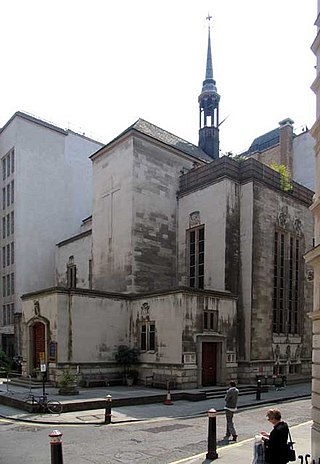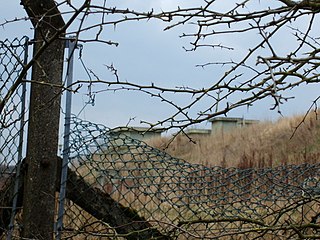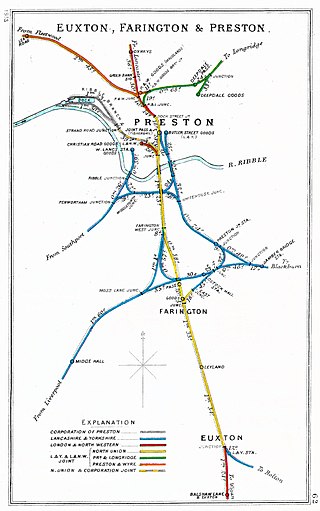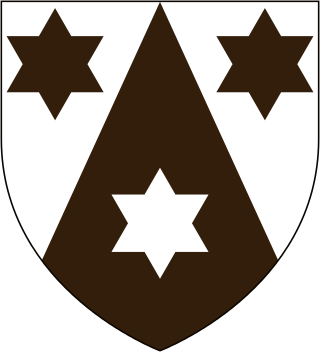Preston Friary was a friary in Lancashire, England.
Preston Friary was a friary in Lancashire, England.
Preston Castle, or Tulketh Castle, was a motte and bailey castle in the Ashton-on-Ribble district of Preston, Lancashire, England.

Burrishoole Friary was a Dominican friary in County Mayo, Ireland. Its ruin is a National Monument.

The Dutch Church, Austin Friars, is a reformed church in the Broad Street Ward, in the City of London. Located on the site of the 13th-century Augustinian friary, the original building granted to Protestant refugees for their church services in 1550 was destroyed during the London Blitz.

Royal Air Force Barton Hall or more simply RAF Barton Hall is a former Royal Air Force station situated between the villages of Barton and Broughton, near Preston, Lancashire, England.
Daisyfield railway station was a railway station that served the Daisyfield area of Blackburn, Lancashire.

Todd Lane Junction, previously called Preston Junction until 1952, was a railway station between Preston and Bamber Bridge which closed to passenger traffic on 7 October 1968. The station was immediately to the north of a triangular junction between lines from Preston, East Lancashire via Bamber Bridge, and Ormskirk via Lostock Hall. The station served as an interchange between the lines. The line from Preston to Bamber Bridge via Todd Lane remained open for freight trains until 4 September 1972 to serve Lostock Hall Gas Works. The track bed is now a public footpath and cycleway.
Chester Carmelite Friary, otherwise Chester Whitefriars, was a friary in the city of Chester in Cheshire, England. The Carmelites were present in Chester from the late 1270s and by the mid-14th century were established as a well-regarded community. Their church and graveyard were popular for burials of the well-to-do and the friary was often mentioned in Chester wills. Their church steeple when rebuilt in 1495 became a useful landmark for ships. The friary was dissolved in 1538. There are no surviving buildings but the street name Whitefriars preserves the memory of the community.
Greyfriars, Beverley was a Franciscan friary in Beverley, the East Riding of Yorkshire, England. It was established before 1267, probably by John de Hightmede, but the exact date is not known. Originally located within the town walls near today's St Mary's Terrace, it was moved outside Keldgate, near Westwood, about 1297. After it had fallen into disrepair in the 1330s, the knight Sir John Hotham of Scorbrough provided funds for its rebuilding in the 1350s. Several members of his family were buried there later. The friary benefitted further from grants made by nobles and merchants. The friars acknowledged royal supremacy in 1534, and the monastery was surrendered to the Bishop of Dover on 25 February 1538–39. Although no buildings of the friary have survived, it is remembered by the street name "Greyfriars Crescent".

Whitefriars, also known as the White Friars or The College of Carmelites, Gloucester, England, was a Carmelite friary of which nothing now survives.

Boston Friary refers to any one of four friaries that existed in Boston, Lincolnshire, England.

York Franciscan Friary was a friary in York, North Yorkshire, England. It was located between York Castle and the River Ouse. In 1538, it fell victim to Henry VIII's Dissolution of the Monasteries. All that now remains of it is a stone wall on King's Staith, adjacent to the Davy Tower on the York city walls.
Augustinian Friary, York was a friary in North Yorkshire, England.
Greyfriars, Shrewsbury was a friary in Shropshire, England.
Tickhill Friary was an Augustinian friary in Tickhill, South Yorkshire, England. John Clarel, a canon of Southwell, founded it about 1260. It was dissolved in 1530. The remains are a Grade II* listed monument. The 14th century buildings were converted into dwellings in the 17th century, extensions followed in the 19th century. Until 1538, the Fitzwilliam tomb was located in the friary church, but was then moved into the parish church.

Denbigh Friary is a ruined monastic religious house located in Clwyd, Wales. It is situated in the valley of the River Clwyd, approximately 1 mile (1.6 km) east of Denbigh. Founded in 1343-50, the friary was dedicated to St Mary, and was a Carmelite community. The English Benedictine abbot, Robert Parfew was involved in the 18 August 1538 surrender of the Carmelites of Denbigh Friary. During the Dissolution, some of the buildings were turned into houses, while wool was sold in the church. The 14th-century building has been in ruins since an 1898 fire. The ruins are mostly from the 13th and 15th centuries, and include parts of a choir, a gable end, and nave walls.

Tulketh Mill is an Edwardian former cotton-spinning mill in Balcarres Road, Tulketh, Preston, Lancashire, England. It was designed by Fred Dixon of Oldham and built for the Tulketh Spinning Company in 1905. It is a grade II listed building. The building currently houses contact centres and offices for Capita, Dixons Carphone and Hinduja Global Solutions.
Scorton railway station served the village of Scorton, Lancashire, England, from 1840 to 1939 on the Lancaster and Preston Junction Railway.
Roebuck railway station served the village of Bilsborrow, Lancashire, England, from 1840 to 1849 on the Lancaster and Preston Junction Railway.

Church Cottage Museum is a 16th-century cottage in Broughton, City of Preston, Lancashire, England.
53°45′35″N2°42′11″W / 53.75985°N 2.703108°W